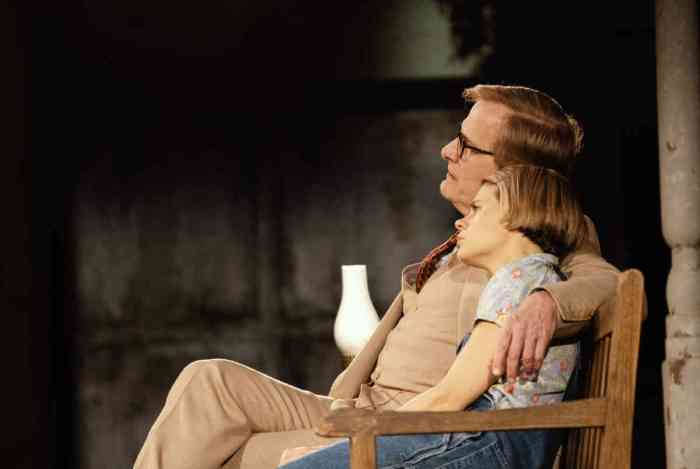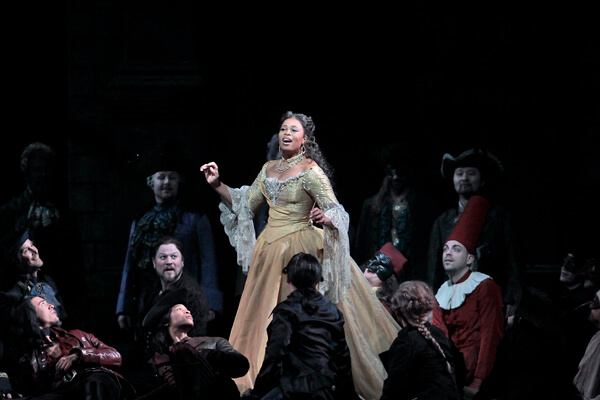Kelli O’Hara and Ken Watanabe in the Lincoln Center production of “The King and I.” | PAUL KOLNIK
BY CHRISTOPHER BYRNE | Rodgers and Hammerstein’s “The King and I” was certainly inspired by the memoir of Anna Leonowens, who was tutor to the children of the king of Siam (contemporary Thailand), but it also seems to draw insights from “Pride and Prejudice,” as well. The story of the headstrong governess and the even more headstrong king is a clash of cultures and customs that ultimately ends in a kind of mutual understanding and support. In a modern era of bitter culture clashes, this gentle story stands as a reminder that our way is not the only way, nor even necessarily the best way.
In the opening moments of the magnificent, multiple Tony-winning Lincoln Center production, impeccably directed by Bartlett Sher, Anna arrives in a ship that seems to dwarf the port of Siam and she tries to whistle away her fears while bringing her British stiff upper lip to the king’s court. There, it is she who is dwarfed — by the splendor of the palace and the seemingly countless number of charges she must oversee. It’s not long, however, before Anna is challenging the king, and the power shifts back and forth between them. What begins as conflict soon becomes a game and, in time, a way of showing respect and appreciation. Even in the secondary plots of young lovers who must hide their affection and wives who know the king’s flaws but love him anyway, the show is about acceptance creating the opportunity for love.
This delicate and nuanced approach to this oft-told tale mitigates the story’s essential colonialist conceit, which could otherwise overwhelm the mood. Sher’s direction emphasizes how antiquated belief systems can — and must — adapt to a changing world.
A classic musical and a new comedy ask age-old question “Who’s on top?”
But you don’t go to see “The King and I” for a philosophical discussion, you’re interested in hearing the wonderful score and experiencing the sumptuous production values the story demands. Here, you are richly rewarded in every respect. Michael Yeargen’s sets are gorgeous. Catherine Zuber’s costumes are beautiful and show sparks of originality. Donald Holder’s lighting is glorious, and Christopher Gattelli’s choreography based on the Jerome Robbins originals is stunning. What’s most remarkable about the design is how the epic story’s sweep is perfectly juxtaposed with its smaller, more intimate elements.
And then there’s the cast. Kelli O’Hara has seldom sounded better. Her beautiful voice and flawless technique are spellbinding, winning our hearts from the start and holding them until the final curtain. Singing some of the best known songs in musical theater — “Getting to Know You,” “Hello, Young Lovers” — she makes them sound new as Anna discovers herself. Ken Watanabe is excellent as the king, his charisma easily overcoming some pronunciation problems.
Ruthie Ann Miles (the spectacular Imelda Marcos in “Here Lies Love”) as Lady Thiang has a centered maturity in “Something Wonderful” that is something even more than that.
Like the relationship between Anna and the king, this production is filled with revelations and discoveries that will take you by surprise, delight you, and prove how even on a huge scale, the comparatively small human heart can be the driving force.
Without the comic talents of the able cast and the manic direction of Alex Timbers, “Permission” at MCC would sink into tedium much sooner than it does. The play by Robert Askins (represented far better on Broadway by the deliciously scabrous “Hand to God”) is really a one-joke sketch about Christian S&M. The gag is that it’s okay to spank your partner erotically, if you do it in Jesus’ name.
Askins, of course, is taking aim at the abhorrent hypocrisy of the Christian right when it comes to all things sexual, but in order to flesh this idea out to a full two hours, Askins throws in plot twists that are predictable without moving it toward resolution. Instead, everything climaxes (pun intended) in a cataclysmic cluster but then just fades away. Other than showing off his antipathy toward organized religion, Askins’ intent remains unclear.
The plot is based on the premise that a man asserts his Biblical dominance in his home by administering corporal punishment. That seems to be working for Zach and Michelle, who practice CDD (Christian Domestic Discipline) — so well, in fact, that Zach gets his friend Eric to try it on his wife, Cynthia. She turns out to be a willing sub, even to the point of being locked away in a room all day toiling on her novel while Eric is at work. Eric becomes a scriptural dom, but in the meanwhile we learn that Zach is really under Michelle’s thumb. It all gets confusing, and there’s even a subplot about Eric, a college professor, and his sex-starved graduate assistant. Askins has the makings of a classic sex farce here, but it’s not finely tuned enough to be consistently funny or deliver the requisitely sustained tension.
The game cast, however, is entertaining to watch. Lucas Near-Verbrugghe as Zach, Nicole Lawrence as Michelle, Elizabeth Reaser as Cynthia, and especially Justin Bartha as Eric are all good comic actors who deliver their one-liners and bits very well. Now, if only it were the play that had been whipped into shape.
THE KING AND I | Vivian Beaumont Theatre, Lincoln Center, 150 W. 65th St. | Tue. at 7 p.m.; Wed.-Sat. at 8 p.m.; Wed., Sat. at 2 p.m.; Sun. at 3 p.m. | $87-$162 at telecharge.com or 212-239-6200 | Three hrs., with intermission
PERMISSION | MCC Theater | Lucille Lortel Theatre, 121 Christopher St., btwn. Hudson & Bleecker Sts. | Through Jun. 14: Thu.-Sat. at 8 p.m.; Sat. at 2 p.m.; Sun. at 3 p.m. | $69-$99 at mcctheater.org or 212-352-3101


































